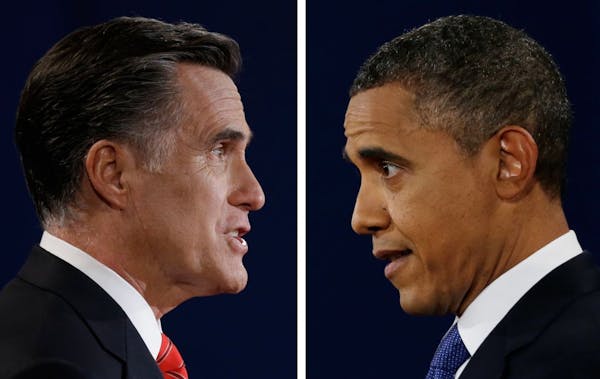Barack Obama and Mitt Romney have lived lives of achievement and purpose. They are men committed to their families, their faiths and their country. This presidential election is a choice between two individuals who are intelligent and capable.
That adds to our dilemma. Like many other independent voters, we have wrestled with our decision. Our votes -- and the votes of other so-called "swing voters" -- represent a huge leap of faith that our chosen candidate will deliver the kind of leadership our nation now needs.
The next president will inherit a domestic economy that, while growing stronger, is still growing too slowly. He must advance policies to help American businesses and workers navigate a global marketplace that is increasingly competitive. The person we elect will have to rein in the federal deficit and national debt. He also will be challenged by a world in which the country's security is tested in new ways and by new enemies.
President Obama has led America for four years, turning around an economy in free fall, reregulating our financial institutions, and advancing investments in health care, education, energy alternatives and the environment. And, he effectively has targeted Al-Qaida and has taken out its leader, Osama bin Laden.
But when asking for a second term, Obama too often seems limited in his vision and timid in his calls to action. He wants America's wealthy to pay more taxes, then seems content to believe this alone will finance our budget obligations. What evidence does Obama offer independent voters that, if re-elected, he will challenge his party's most entrenched interests to control the escalating costs of Medicare and Social Security while delivering on their fundamental promise to current and future generations?
Obama promises to strengthen the middle class, making access to affordable health care a cornerstone. Too often, though, he sees his health program as the end of the journey. Will a re-elected Obama take the important next steps to control health costs and implement meaningful initiatives to measure quality and pay for positive outcomes?
On foreign policy, pledging to end the Afghan war -- just as he ended our Iraqi engagement -- does not, of itself, end the threat of terrorist groups, as the embassy attack in Libya reminds us. What steps is Obama prepared to take in a second term to defeat this threat?
A vote for Romney comes with its own uncertainty.
Throughout his career, Romney forged an impressive record of accomplishment in the private sector -- leading to the success of companies such as Staples, Domino's Pizza and Sports Authority, and turning around the Salt Lake City Olympics. As Massachusetts governor, he worked with a Democratic legislature to expand health coverage, improve public schools and eliminate a $3 billion budget deficit.
However, candidate Romney often is a very different person from Gov. Romney. His propensity for changing course on policies, sometimes refuting his own record, seems driven by his desire to play to the most ideological members of his own party. Once elected, would he be bound by his more partisan campaign rhetoric -- or will he revert to the bipartisan path he followed as governor?
In the first debate, Romney criticized Obama for not embracing the bipartisan Simpson-Bowles deficit-reduction plan, then announced he wouldn't support the commission's approach, either. He instead avows the job-creating benefits of deeper tax cuts and promises to maintain U.S. military supremacy. How can he credibly reduce the deficit while leaving both taxes and defense spending off the table?
On foreign policy, he criticizes the president's leadership but often is vague with alternatives. Like Obama four years ago, he is new to foreign policy. But he suggests a more muscular approach toward adversaries, especially Russia and Iran, without answering what that means and how it enhances our security.
Disappointed in "hope and change," many Americans are eager for new leadership, but too often they hear in Romney echoes of the failed Bush policies.
Voters' leaps of faith go beyond the policies of the two men. The election of a president also is about leadership. We need the next president to bring a polarized public -- and a polarized Congress -- together, forging consensus around difficult choices and shared sacrifice. Do we believe Obama in a second term can be a unifier, or should we place our faith in a new leader? That is the question that keeps this election so close.
The two of us may end up splitting our votes in the presidential race. But those votes will be more an act of faith than certitude.
--------------------------
Tom Horner is a public-affairs consultant and was chief of staff to former U.S. Sen. Dave Durenberger, R-Minn. Tim Penny is president and CEO of the Southern Minnesota Initiative Foundation and is a former Democratic member of Congress. Both are former Independence Party candidates for governor.
We regulate a tiny fraction of the 12,000 'forever chemicals'
Aid votes show Congress can still work
Readers Write: Cellphones in schools, potholes, child abuse, good journalism


